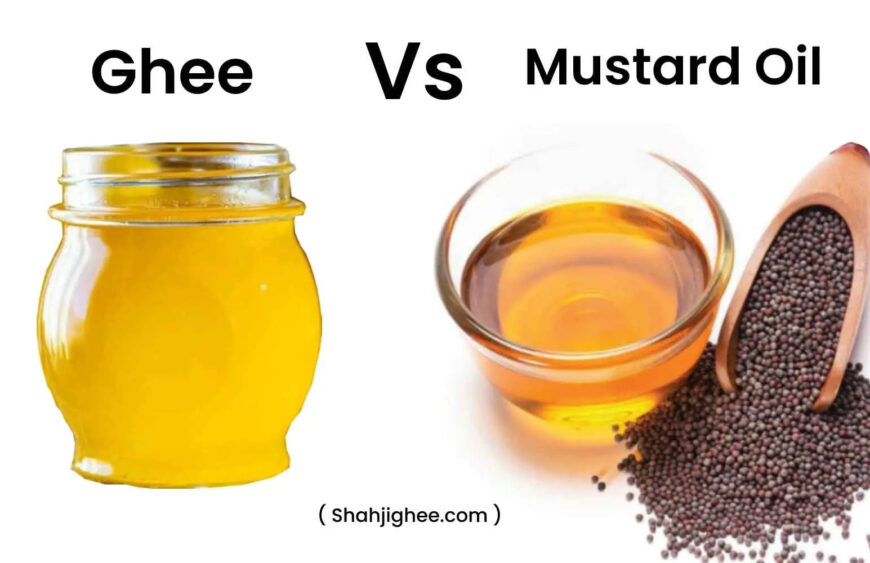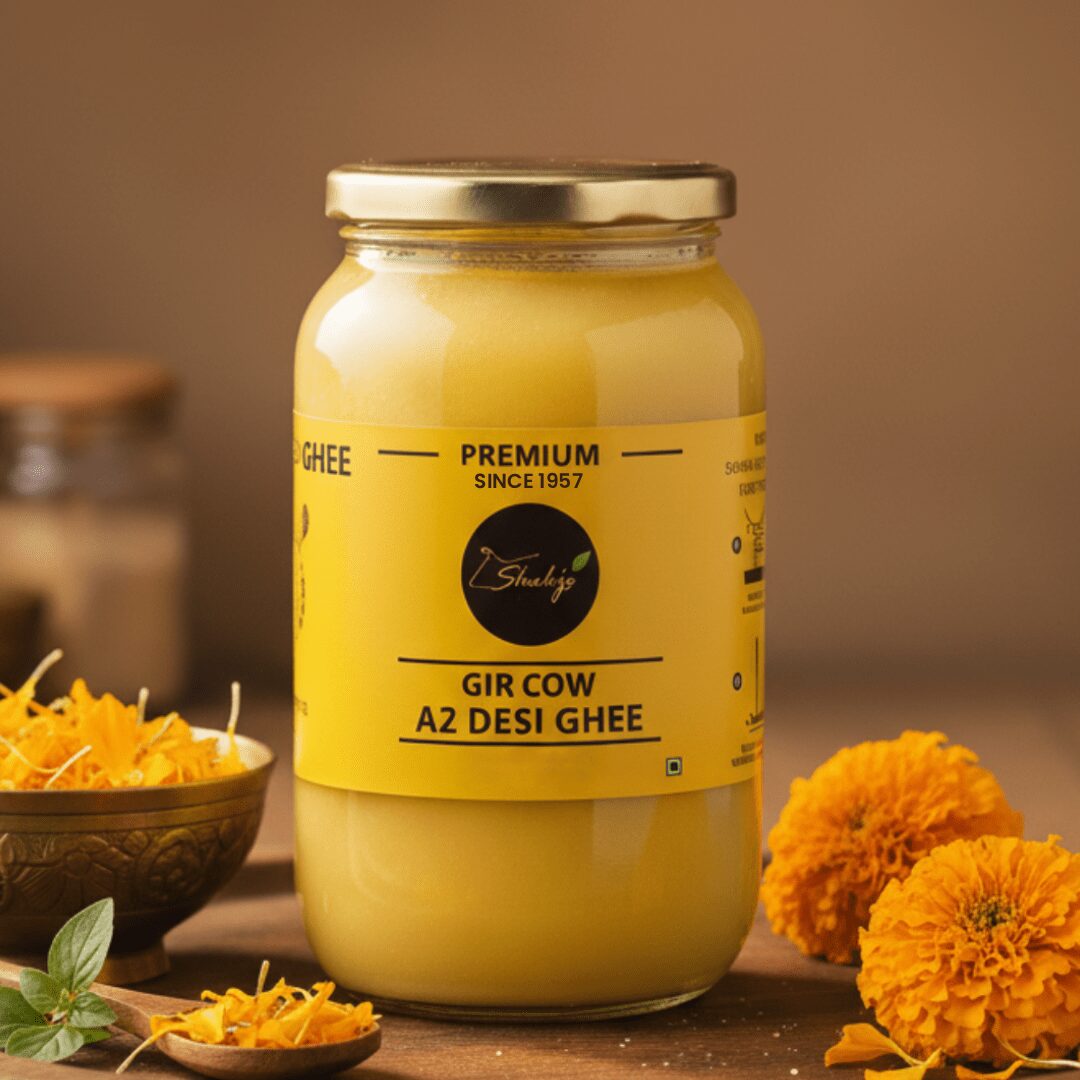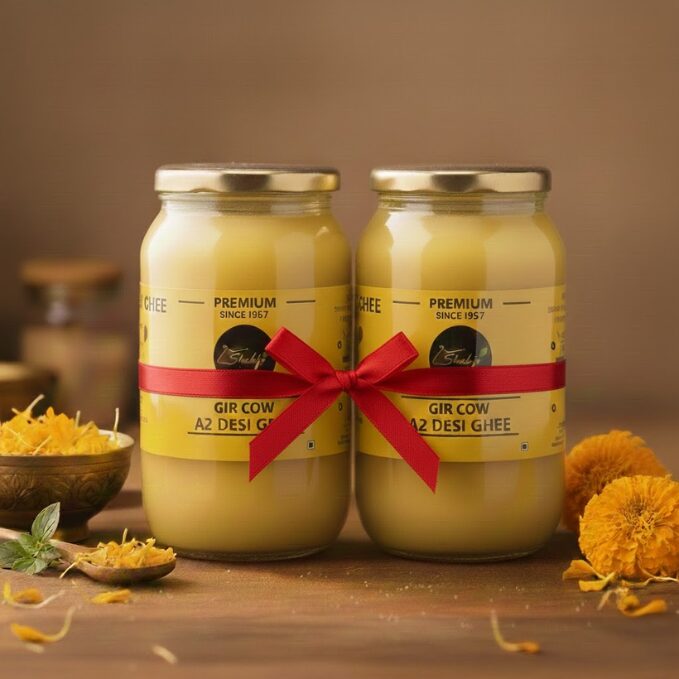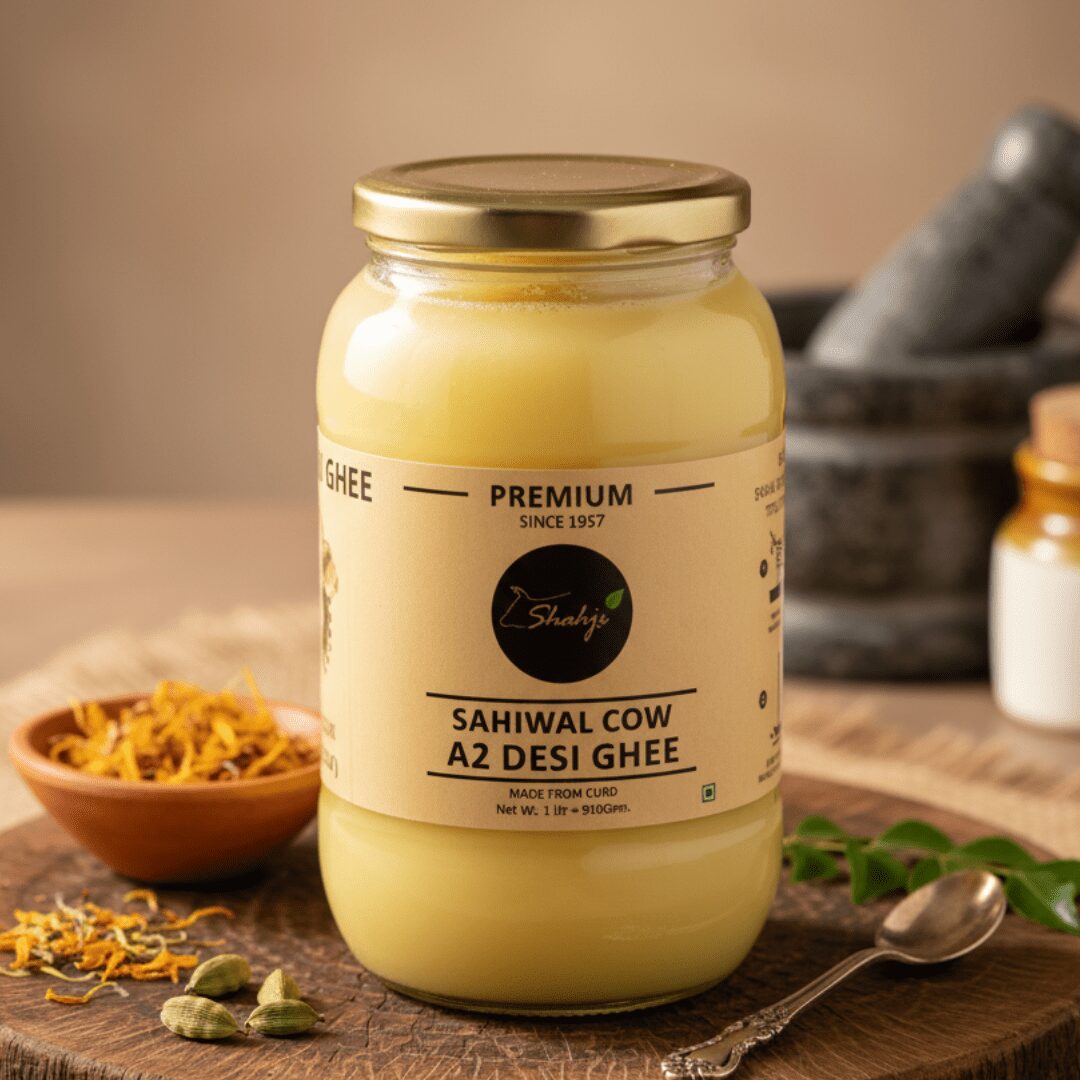Ghee Vs Mustard Oil: Which is Better & Healthier?

Ghee is often called the elixir given by Gods. Mustard oil, on the other hand, is a staple in most Indian households. Ghee and mustard oil possess great ayurvedic qualities and have been used to cook and heal since ancient times. But which is the healthiest? Let us have a look.
Ghee Vs Mustard Oil – All Comparison
Desi Ghee |
Mustard oil | |
Source | Cow or buffalo milk | Mustard seed (Brassica family) |
Procedure |
|
|
Colour | Golden yellow or pale yellow | Reddish brown |
Taste | Buttery, Nutty taste | Tangy, Pungent taste |
Fat content | ● 32% Mono-unsaturated Fat● 45-65% Saturated fat | ● 60% Mono-unsaturated fat● 21% Poly-unsaturated fats● 12% Saturated fat |
Nutrients | Vitamins A, D, E, K, Omega-3, Omega-6, Butyric acid, Medium-chain Triglycerides, Calcium, Potassium, Phosphorus | Vitamins A, B, D, E, K, Omega-3, Omega-6, Glucosinolate, Ally Isothiocyanate, Iron, Calcium, Magnesium |
Smoke point | 250 ℃ | 249℃ |
Reusability | Reusable | Not reusable |
Ghee Vs Mustard Oil: Health Benefits Comparison

Health Benefits of Ghee
- Consuming ghee daily keeps the body warm and protects health from mild fever, acidity, and the common cold.
- Ayurveda advocates Ghee as a cooling agent which is healthy for the eyes. It removes dryness and fatigue from the eyes. Omega 3 fatty acids of the ghee are significant constituents to maintain eyesight issues.
- Ghee has butyric acid which reduces abdominal pain and bloating. It lubricates the intestinal walls and prevents constipation.
- Ghee absorbs fat-soluble vitamins and minerals which function as antioxidants and hence build a strong immune system.
- Ghee acts as a lubricant and relieves joint pains. The omega-3 fatty acids and calcium found in the ghee are helpful in the case of arthritis and osteoporosis.
- Ghee keeps the cells hydrated and helps in brain functions like learning, memory, and concentration. Vitamin E of ghee prevents brain- disorders.
- Ghee is a rich source of vitamins D and E, and calcium which provide deep hydration to the skin cells and make skin soft and supple.
- Ghee comprises omega-3 fatty acids which help in reducing the bad cholesterol in the body. It also improves heart health.
- Ghee sustains the hair follicles, thus strengthening the hair roots. Ghee also eliminates the problem of dandruff.
- Ghee protects from infections of the nose, throat, and chest.
Health Benefits of Mustard Oil
- Mustard oil is used against colds, coughs, congestion, and sinusitis.
- Allyl Isothiocyanate and Glucosinolate, found in mustard oil, are anti-fungal. Glucosinolate has antibiotic, fungicidal, and cancer prevention qualities too. It is also good for colorectal and gastrointestinal health.
- Mustard oil reduces cholesterol, and its fatty acids improve the functions of red blood cells, plasma, cell lipids, and cell membranes.
- Mustard oil stimulates sweat glands, thus promoting blood circulation throughout the body, regulating body temperature, rejuvenating and relaxing muscles, and removing body toxins from the body.
- Mustard oil massage soothes aching joints and gives relief to muscles. Omega-3 fatty acids help to ease stiffness and pain caused due to arthritis.
- The optimum proportion of omega-3, omega-6 fatty acids, and vitamin E provides the desired nourishment and boosts the immune system.
- Vitamin E of mustard oil helps control diabetes, and its trans fat helps maintain insulin.
- Mustard oil promotes Oral Health by attacking fat-soluble bacteria and stopping plaque formation and gum bleeding
- Mustard oil comprises antioxidants, minerals (iron, calcium, and magnesium), and vitamins like A, D, E, and K, all of which are good for hair growth.
- Mustard oil is rich in vitamin B complex, vitamin A, vitamin E, calcium, protein, and omega-3 fatty acids which are great for the skin.
Also Read:
- Bilona Ghee Vs Normal Ghee: Which Ghee is Better?
- A1 Ghee Vs A2 Ghee: Which is Best for Health?
- Is Ghee Good For Diabetics? – Shahjighee
Ghee Vs Mustard Oil: Possible Side Effects Comparison
Possible Side Effects of Ghee
The high saturated fat content of ghee has led to the belief that it is unhealthy. However, this isn\’t true. The peculiar short-chain fatty acid structure of ghee helps it to mobilise stubborn fat from body parts. Ghee has zero unhealthy trans fats. But you have to consume it in moderation.
Possible Side Effects of Mustard Oil
Erucic acid in mustard oil has been linked to cardiac damage. Mustard seeds and oil are associated with allergic reactions too. A 2016 study comparing the two found coronary heart disease higher in people consuming mustard oil. Another study found ghee consumption linked to lower cholesterol levels vis-a-vis mustard oil.
Also Read: Buffalo Ghee Vs Cow Ghee – Which is Better?
Conclusion
Both desi ghee and mustard oil have many great qualities. However, ghee predominantly stands out as the best oil because it has a higher smoke point and high stability. It is reusable, unlike mustard oil.
However, always consume ghee in moderation. And buy only pure desi ghee from premium brands like Shahji Ghee, which makes ghee through the bilona process.
A2 Gir Cow Ghee
1 LTR
Best Price: ₹2125 with Coupons

A2 Gir Cow Ghee 2 Litre Combo Pack
Best Price: ₹4125 with Coupons
A2 Sahiwal Cow Ghee
1 LTR
Best Price: ₹1619 with Coupons

Which is better desi ghee or mustard oil?
Desi ghee is better than mustard oil in many ways. It helps to keep you healthy and makes your food tastier. You can spread it on bread, rotis, parathas etc. If you want something that can be used in deep frying then desi ghee is the best choice due to its high smoke point.
Can we eat mustard oil or desi ghee together?
Mustard oil is widely used for cooking and for baby massage. But ghee is used in both cooking (saute, roast and deep frying) as well as spreading on bread, rotis, and parathas. It can also be used in dal, khichdis and any other food item to enhance the taste. But mustard oil has limited use and is mainly used for cooking vegetables.
Does mustard oil increase cholesterol?
No, Actually mustard oil is considered to be high in Monounsaturated Fatty Acids (MUFA) and Polyunsaturated Fatty Acids (PUFA). They help increase good cholesterol (HDL) and decrease bad cholesterol (LDL). Also, its consumption may reduce the risk of coronary heart disease and help with weight loss as well.
Which oil is best to avoid cholesterol?
If you want to avoid bad cholesterol then you should use mustard oil or desi ghee as it contains high Monounsaturated Fatty Acids (MUFA) and Polyunsaturated Fatty Acids (PUFA). They help increase good cholesterol (HDL) and decrease bad cholesterol (LDL).
What are the 5 signs of high cholesterol?
If your cholesterol level is getting high then you can experience symptoms like:
Left-side chest pain
Dizziness
Unsteady gait
Slurred speech
Stroke













